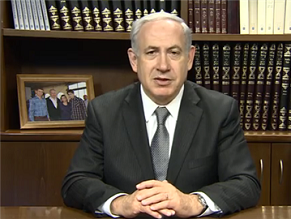|
World Jewish News

Israeli Prime Minister Benjamin Netanyahu
|
Netanyahu: Vilification of Israel ‘part of anti-Semitic campaign that is levelled against the Jewish people and their state’
29.05.2013, Israel Vilifying Israel has become the acceptable face of anti-Semitic rhetoric, Israeli Premier Benjamin Netanyahu told the fourth annual Global Forum for Combating Anti-Semitism in Jerusalem Tuesday. “After the rise of Israel, what is fashionable today is to say, "Well, I don't hate Jews, I just don't think they should have a state." Or, effectively, that their state is an illegitimate one that doesn't have the right to exist,” he added.
Addressing common misconceptions about Israel’s attitude to the Middle East Peace Process, he insisted that the Jewish State was prepared to make compromises to achieve “a genuine peace” with the Palestinians, as he contended that this desire was “not reciprocated as much as we want, and recently it is not reciprocated at all. We can only hope that it will change”.
Modern-day anti-Semitism is based on “three vilifications”, he charged, namely “that Israel is guilty of war crimes, that it doesn't want peace, it wants to continue expansionist policies, and that we are guilty of violating human rights”. Dismissing the legitimacy of such claims as “part and parcel of the anti-Semitic campaign that is levelled against the Jewish people and their state”, he called on global Jewish groups to tackle the escalating problem with the “only one remedy for the slander, and that's the truth. And I encourage you to fight and win the battle of truth”.
Also addressing delegates Tuesday at the start of the three day event in his capacity as conference co-host was Deputy Foreign Minister Zeev Elkin, who refuted the notion that “anti-Semitism is only an Israeli problem or just a Jewish problem”. “It is foremost the problem of every society in which it is allowed to manifest itself. History has taught us that for evil to prevail over good, it is enough that decent people stay silent and complacent while the immoral and hateful few gain power. That is why it is so important that governments, parliaments, international organizations and civil society around the world adopt a zero-tolerance approach towards anti-Semitism,” he concluded.
Invoking the recent surge in support for far-right political parties across Europe “who no longer shy (away) from promoting racist and extremist policies”, specifying neo-Nazi marches recorded in Greece and the fatal shooting of four Jews outside a Toulouse school by radical Islamist killer Mohammed Merah last March, he insisted that “this can no longer be characterized as sporadic or rare events. It is time we look this problem in the eye and call by its name – rise in blatant anti-Semitism”.
Describing the advent of so-called modern anti-Semitism as “tragic”, he lamented its rise to prominence in Muslim society particularly across Iran and the Arab world, “where Jews and Muslims used to live for centuries in relative harmony”. Equating it with “the hateful and malicious educational and media brainwashing against Israel and Jews” exhibited in the neighbouring Palestinian territories, he concluded: “Anti-Israeli rhetoric and propaganda in the Arab world is all too often nothing but age old anti-Semitism without even a new veneer.”
Differentiating between “legitimate” criticism of Israeli policy, he maintained that “Israel is willing to accept criticism of its acts, decisions and policies, but criticism is only legitimate as long it does not single out Israel for different treatment and does not delegitimise our existence and right to exist”.
Continuing in this vein, Elkin continued to slam the UN Human Rights Council for its disproportionate criticism of Israel’s human rights record, questioning how “such a miserable record (could) be defined as anything other than anti-Semitism in the guise of anti-Israelism”. Referencing the Jewish State’s responsive decision to freeze relations with the council last year in the aftermath of a series of controversial resolutions against the Jewish State, he announced a considered u-turn in policy as vowed to pursue a “diplomatic engagement with the Council and major actors in the international community to see if we can arrive at understandings and guarantees that will enable our return to the Council while ensuring that fair play and international standards are applied towards Israel”.
Closing out his address with a message of hope however, acknowledging the interfaith demographic of conference attendees, he insisted that “not all is bleak”, concluding: “Anti-Semites throughout history tried to isolate the Jews, to make them feel alone. Your coming here this evening sends them a strong message: Jews, Jewish communities and Israel, the one and only homeland of the Jewish people, are not alone and shall never be alone again.”
The second day of fourth international GFCA Wednesday was due to feature a conference highlight in the form of 10 working groups to deliberate and formulate concrete action plans in response to wide-ranging problems from Anti-Semitism in the Muslim and Arab world to that experience in the EU and western Europe, cyber anti-Semitism, and interfaith dialogue as a means of combating anti-Semtiism.
EJP
|
|
